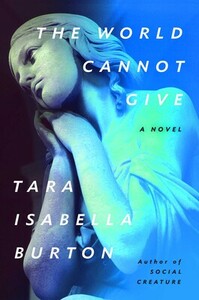Take a photo of a barcode or cover
dark
emotional
tense
medium-paced
Plot or Character Driven:
A mix
Strong character development:
Complicated
Loveable characters:
No
Diverse cast of characters:
Yes
Flaws of characters a main focus:
Yes
dark
mysterious
medium-paced
Plot or Character Driven:
Character
Strong character development:
Complicated
Loveable characters:
Complicated
Diverse cast of characters:
Yes
Flaws of characters a main focus:
Yes
The premise was promising. It's a quick read. Burton has a very easy-to-read style. But it was a relatively shallow book.
Vogue hypes this up as "The Secret History meets The Price of Salt", which is purely on a superficial level. The main issue was the characters. The story hinges on the obsessive chemistry between Laura and Virginia. The problem is Virginia isn't very charismatic or mysterious (enough to be alluring). 'She's no Henry a la The Secret History' or 'Carol from the Price of Salt". I didn't buy why people were drawn to her, why Laura was drawn to her. The characters were surprisingly one-dimensional. I was waiting for a real twist to happen but the book plays out how you expect.
I think the book had a lot of potential. I was very interested in a Byronic figure lionized after his death. The themes of romanticizing the past and this obsession to maintain traditions. I was disappointed that those themes weren't explored in-depth.
Vogue hypes this up as "The Secret History meets The Price of Salt", which is purely on a superficial level. The main issue was the characters. The story hinges on the obsessive chemistry between Laura and Virginia. The problem is Virginia isn't very charismatic or mysterious (enough to be alluring). 'She's no Henry a la The Secret History' or 'Carol from the Price of Salt". I didn't buy why people were drawn to her, why Laura was drawn to her. The characters were surprisingly one-dimensional. I was waiting for a real twist to happen but the book plays out how you expect.
I think the book had a lot of potential. I was very interested in a Byronic figure lionized after his death. The themes of romanticizing the past and this obsession to maintain traditions. I was disappointed that those themes weren't explored in-depth.
dark
reflective
sad
medium-paced
Plot or Character Driven:
A mix
Strong character development:
Yes
Loveable characters:
Complicated
Diverse cast of characters:
Complicated
Flaws of characters a main focus:
Yes
dark
emotional
reflective
medium-paced
Plot or Character Driven:
A mix
Strong character development:
Complicated
Loveable characters:
Yes
Flaws of characters a main focus:
Yes
adventurous
dark
emotional
mysterious
sad
medium-paced
Plot or Character Driven:
Character
Strong character development:
Yes
Loveable characters:
Complicated
Diverse cast of characters:
Complicated
Flaws of characters a main focus:
Yes
mysterious
reflective
tense
slow-paced
Plot or Character Driven:
Character
Strong character development:
Complicated
Loveable characters:
Complicated
Diverse cast of characters:
Yes
Flaws of characters a main focus:
Yes
dark
reflective
tense
medium-paced
Plot or Character Driven:
A mix
Strong character development:
Yes
Loveable characters:
Complicated
Diverse cast of characters:
Yes
Flaws of characters a main focus:
Yes
Wow, what a spectacular novel. I was entranced from the first few pages. This was a whirlwind, and a beautifully tragic one at that.
For those who love dark academia and destructive queer romances, this is definitely the one for you.
For those who love dark academia and destructive queer romances, this is definitely the one for you.
Name dropping The Secret History in a book's blurb is a dangerous game to play. I would not say that Tara Isabella Burton's book is entirely comparable-- even if just to avoid all the obnoxious The Secret History devotees who will come out of the woodwork to trash talk anything that isn't literally a copy of The Secret History. Because The World Cannot Give is not some kind of gender swapped The Secret History, and it does not try to be, either.
The World Cannot Give was a really poignant meditation on the red hot grip of teenage obsession and toxic relationship dynamics. Our main character and narrator, Laura Stearns, lives her life propelled by her fixations. At the beginning of the book, her only concern is getting into St. Dunstan's, where her favorite author Sebastian Webster wrote his magnum opus. "Favorite author" doesn't begin to cover it-- Laura worships Webster, and cannot seem to fathom that he might be at all problematic. Laura is sort of annoying, stuck-up, and extremely weak-willed. But this is what makes her endearing to me-- I think most people reading this book were annoying and stuck-up in high school. Not in a bad way, because I was too; I am trying to challenge criticisms of Laura's character as some kind of totally unsympathetic bourgeois brat. Laura, whether we like it or not, is a relatable and very flawed character. She is not some noble heroine who wants to do the right thing at all costs. She does not make the right choices, and she does not attach herself to the right people. That's what propels Burton's book, and I think it was an excellent choice.
Within the world of St. Dunstan's, all other relationships fall by the wayside when one meets Virginia Strauss. Laura meets Virginia early on, and is infatuated from the get-- the sort of psuedo-sapphic (or maybe totally gay), intense interpersonal obsession that teen girls tend to suffer from. Laura does not bother to make any other friends, except some of the boys who also follow Virginia as if the very air she breathes is intoxicating. But at the same time, they don't like her very much. Virginia, too, is unpleasant. She is extraordinarily vain, insecure, emotionally cold, and suffers from a secret yet obvious eating disorder shrouded in religion.
Virginia is something of a holy figure to Laura and, at first, the boys-- until they find a way to publicly strip her of her dignity and, therefore, much of her power. Which, in retrospect, was a huge mistake on their part. After this, a seemingly small convergence of events precipitates the honestly grisly, tragic ending of the book. While part of me wishes there had been more insight into Virginia's inner life, I also think it's powerful that we really do come at it from Laura's point of view. Laura sees what she wants to see (aka nothing) and, in the end, she is just as horrified as the reader.
That said, I still feel it was a bit abrupt, which is one of my few complaints.
Final note: my Catholic upbringing definitely had bearing on my understanding of certain dynamics, traditions, and devotions in Burton's book, which was a little bonus treat for me. Like, oh, the Magnificat?? I was BORN reciting the Magnificat. Me and Mary are besties.
I'll say that The World Cannot Give is about a 4 out of 5 stars. The writing style wasn't fully my jam, I wanted more detail and world building, and the ending felt abrupt. But I did like the book, especially the dynamics it explored and the tinge of religion sans any proselytizing.
The World Cannot Give was a really poignant meditation on the red hot grip of teenage obsession and toxic relationship dynamics. Our main character and narrator, Laura Stearns, lives her life propelled by her fixations. At the beginning of the book, her only concern is getting into St. Dunstan's, where her favorite author Sebastian Webster wrote his magnum opus. "Favorite author" doesn't begin to cover it-- Laura worships Webster, and cannot seem to fathom that he might be at all problematic. Laura is sort of annoying, stuck-up, and extremely weak-willed. But this is what makes her endearing to me-- I think most people reading this book were annoying and stuck-up in high school. Not in a bad way, because I was too; I am trying to challenge criticisms of Laura's character as some kind of totally unsympathetic bourgeois brat. Laura, whether we like it or not, is a relatable and very flawed character. She is not some noble heroine who wants to do the right thing at all costs. She does not make the right choices, and she does not attach herself to the right people. That's what propels Burton's book, and I think it was an excellent choice.
Within the world of St. Dunstan's, all other relationships fall by the wayside when one meets Virginia Strauss. Laura meets Virginia early on, and is infatuated from the get-- the sort of psuedo-sapphic (or maybe totally gay), intense interpersonal obsession that teen girls tend to suffer from. Laura does not bother to make any other friends, except some of the boys who also follow Virginia as if the very air she breathes is intoxicating. But at the same time, they don't like her very much. Virginia, too, is unpleasant. She is extraordinarily vain, insecure, emotionally cold, and suffers from a secret yet obvious eating disorder shrouded in religion.
Virginia is something of a holy figure to Laura and, at first, the boys-- until they find a way to publicly strip her of her dignity and, therefore, much of her power. Which, in retrospect, was a huge mistake on their part. After this, a seemingly small convergence of events precipitates the honestly grisly, tragic ending of the book. While part of me wishes there had been more insight into Virginia's inner life, I also think it's powerful that we really do come at it from Laura's point of view. Laura sees what she wants to see (aka nothing) and, in the end, she is just as horrified as the reader.
That said, I still feel it was a bit abrupt, which is one of my few complaints.
Final note: my Catholic upbringing definitely had bearing on my understanding of certain dynamics, traditions, and devotions in Burton's book, which was a little bonus treat for me. Like, oh, the Magnificat?? I was BORN reciting the Magnificat. Me and Mary are besties.
I'll say that The World Cannot Give is about a 4 out of 5 stars. The writing style wasn't fully my jam, I wanted more detail and world building, and the ending felt abrupt. But I did like the book, especially the dynamics it explored and the tinge of religion sans any proselytizing.
challenging
dark
emotional
reflective
tense
medium-paced
Plot or Character Driven:
Character
Strong character development:
Complicated
Loveable characters:
Complicated
Diverse cast of characters:
Complicated
Flaws of characters a main focus:
Yes
Virginia Strauss, asexual (?) menace, who is NOT the protagonist but IS the center of the universe, makes her problems everyone else's problems until her enablers decide they've had enough, until she then decides she's had enough of that.
A curious first book of the year for me, occasionally unexpectedly dark and unpredictable all the way through. Even when I was halfway through this book, I felt like I had no idea what could unfold next because of the obsessive and irrational nature of pretty much the entire cast of characters. Surprisingly good but faltered slightly for me around the 2/3 mark.
A curious first book of the year for me, occasionally unexpectedly dark and unpredictable all the way through. Even when I was halfway through this book, I felt like I had no idea what could unfold next because of the obsessive and irrational nature of pretty much the entire cast of characters. Surprisingly good but faltered slightly for me around the 2/3 mark.
medium-paced
Plot or Character Driven:
A mix
Strong character development:
Complicated
Loveable characters:
Complicated
Diverse cast of characters:
No
Flaws of characters a main focus:
Yes
This starts out fun with Laura, a dramatic and ridiculous teenager, swooning over Sebastian Webster, a long-dead teenage writer whose book describes his search for a <i>shipwreck of the soul</i>. Laura is leaving her home outside Las Vegas to attend St. Dunstan's (Webster's alma mater) in search of her own shipwreck.
Laura is a follower, not a leader, and she latches onto Virginia, the leader of the school choir, who is proposed to the reader as a charismatic figure at the head of a little choir cult focused on becoming World-Historical like Webster. It was difficult for me to think anyone would care what Virginia was doing, as she didn't seem compelling to me, and Laura's devotion to her made Laura seem pathetic. I didn't really like any of the characters, certainly not Laura.
It all ends up about how you'd expect.
Laura is a follower, not a leader, and she latches onto Virginia, the leader of the school choir, who is proposed to the reader as a charismatic figure at the head of a little choir cult focused on becoming World-Historical like Webster. It was difficult for me to think anyone would care what Virginia was doing, as she didn't seem compelling to me, and Laura's devotion to her made Laura seem pathetic. I didn't really like any of the characters, certainly not Laura.
It all ends up about how you'd expect.







